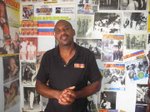Resettling in Jamaica seemed easy for Vere and his American born wife and she quickly adapted to the Jamaican way of life. Vere started writing for the Evon Blake owned Spotlight and Newday publications and the Jamaica Times. Again the old flare for telling it like it is started to impact the Jamaican media landscape as he took the supervising editorship of the Jamaica Times. He however got into early trouble when he became involved in a libel suit to the tune of 250 pounds damages and 1100 pounds in cost.
In 1947 he joined the Gleaner Company and was quickly out of there after what was deemed, a difference of opinion. The Advocate Newspaper was his next stop until he rejoined the Gleaner Company, this time as a writer with the company's afternoon paper, `The Star`, in 1952. Vere used his pen to great effect in his popular `Vere Johns Say`, a column made most famous up to the time of his death in 1966. A hard hitting writer, he spared non as he exposed many an absurdity and abuse, and the public man who felt he could never win the approval of Vere Johns, might sometimes be led to seek at least the approval of his conscience.
Not clearly expressing his political persuasion, Vere found the ideals of People National Party (PNP) more to his liking, as the party it appeared, seemed to expressed the aspiration of the newspaper-reading, working and middle-class folks. Nonetheless, Vere's success as a columnist was due mainly to his belief, in what was his own conviction.
During his journalistic work Vere joined The RAF_Recruiting Staff in 1943 and the following year he was transferred to Palisadoes as Chief Clerk in charge of Family Allowance. At the time too he started managing the Majestic Theatre along with his wife. It was at that theatre and others such as the Ward, Gaiety, Carib, Palace, Queens,Ambassador and theatres throughout rural Jamaica that he made his mark. Indeed the cream of the crop of Jamaica's musical greats were exposed via the `Opportunity Hour`, among them Lascelles Perkins, Alton & Eddie, Higgs & Wilson, Hortense Ellis, Stranger Cole, Jimmy Tucker, Simms & Robinson, Blues Busters, Fay Benneth, Lloyd Clarke, John Holt, Wilfred `Jackie` Edwards, Carl `Jackie` Estick, Roy Richards, Glen Adams, Lord Tanamo, Count Sticky, Derrick Morgan, Derrick Harriott, Rico Rodriques, Lester Sterling and Charles `Charlie Organaire` Cameron.
On the Jamaican acting scene, Vere was simple awesome in productions such as `Babes In The Woods`, `Fools Paradise`,`Arsenic and Old Lace`, `The King`, `Hamlet`, `The Songs of Bernadette`,`The Ghost Train`,`Are You A Mason`,`Merchant of Venice`, `Othello`and`Doctor Pilski. In 1955 he starred in the motion picture `Manfish` which was filmed at Morgan's Harbour, outside Port Royal. In 1956 he acted in one of the first Jamaican produced films by the Jamaica Film Unit, `It Could Happen To You`.
Vere was buried with military honours at the Garrison cemetery, Up Park Camp, with some of the most prominent Jamaicans turning out to pay their last respect to the giant.
Today, there is not one public or private monument to honour the great Man. No street, school,park, theatre, statue, building or even a scholarship in memory of the Vere Everette Johns and his wife Lillian Johns.
Soon to be released `Remembering Vere Johns`, the DVD series and Vintage Boss Magazine, special series, `Vere Johns The Legend`
Soon to be released. Remembering Vere Johns: The DVD series!
Vintage Boss














